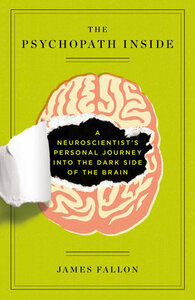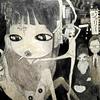Take a photo of a barcode or cover
183 reviews for:
The Psychopath Inside: A Neuroscientist's Personal Journey into the Dark Side of the Brain
James Fallon
183 reviews for:
The Psychopath Inside: A Neuroscientist's Personal Journey into the Dark Side of the Brain
James Fallon
The strange thing about getting multiple books about psychopathy in from the library is how quickly you get to see the differences in the styles of the books. Having read the M. E. Thomas one a few weeks back, reading a more clinical take was an interesting endeavor.
The hook with this book is how Fallon, while investigating other brain issues for things like Alzheimer's and such, inadvertently learned that his brain scan matched many society would consider to be psychopathic. This brought him full bore into an investigation of psychopathy and prompted a look back in his own life.
The book, I suppose, is the better of the recent ones. His biographical stuff wasn't terribly interesting, the clinical stuff often too clinical and dry for me to get invested in, so what was left were some interesting pieces bridged by a lot of less interesting parts along the way. The ending portion almost redeems it, but not quite, as he largely abandons the likely result in favor of his own original hypothesis.
Honestly, if this is a topic you're interested in, the Jon Rosnon book, The Psychopath Test, is ultimately the best read of the group even if it's less traditionally informative and more pop-sciency.
The hook with this book is how Fallon, while investigating other brain issues for things like Alzheimer's and such, inadvertently learned that his brain scan matched many society would consider to be psychopathic. This brought him full bore into an investigation of psychopathy and prompted a look back in his own life.
The book, I suppose, is the better of the recent ones. His biographical stuff wasn't terribly interesting, the clinical stuff often too clinical and dry for me to get invested in, so what was left were some interesting pieces bridged by a lot of less interesting parts along the way. The ending portion almost redeems it, but not quite, as he largely abandons the likely result in favor of his own original hypothesis.
Honestly, if this is a topic you're interested in, the Jon Rosnon book, The Psychopath Test, is ultimately the best read of the group even if it's less traditionally informative and more pop-sciency.
informative
informative
reflective
slow-paced
dark
informative
fast-paced
I thought it would be more intresting, I couldn't finished it because I got bored.
This may have been interesting but I’ll never know because I fell asleep every 2-3 chapters. There is way too much technical information provided. Some interesting facts but I didn’t finish because I had to give it back to the library. I guess I’ll never know how his theory panned out. Sad face.
informative
slow-paced
I found the book a bit on the rambling side. Including too much of the mundane. Hell, this is my life (and all my privileges) with all the boring details! However, it did change some pre-existing beliefs and on that alone I give it 4-stars.
DNFed. I spent way to much reading this and it bored me to death. I won't deny there was some interesting parts that were very beneficial and that kept me going but for the most of it I felt like the author was bragging about how he had the mind of a psychopath but he wasn't one. I felt like he made this book as excuse to talk about himself, his upbringing an his accomplishments because no one asked for it, I assume that every person who got into this book was looking for talks about psychopathy not the Wekipidea page of the author. It could've been more honest if he just made an autobiografy and included the brain scan part in it as a chapter.
As a highschool student I was expecting to encounter some scientific passages that exceeded my basic level of knowlegde when it came to the human brain but these passages were so long and the author went on for chapters talking about something that no one but specialist in neurology would understand, it was ennoying and it got to a point where I felt like the author was flexing his knowledge because most of these long passages could've been avoided if he just explained simply the matter and went on with the crusial part of the book. At some point I didn't care anymore why he wasn't a psychopath, all I knew was that I was bored to death.
The two intresting points I got from this book:
- The human brain is a dark complicated place and humans themselves hasn't figured out much about it yet.
- Psychopaths cannot be specifically defined, there's overall traits that may identify a psychopath but it's not always accurate beacuse psychopathy is still a vague matter. (Also psychopaths on TV aren't always a great representation, they can be too extreme sometimes!)
As a highschool student I was expecting to encounter some scientific passages that exceeded my basic level of knowlegde when it came to the human brain but these passages were so long and the author went on for chapters talking about something that no one but specialist in neurology would understand, it was ennoying and it got to a point where I felt like the author was flexing his knowledge because most of these long passages could've been avoided if he just explained simply the matter and went on with the crusial part of the book. At some point I didn't care anymore why he wasn't a psychopath, all I knew was that I was bored to death.
The two intresting points I got from this book:
- The human brain is a dark complicated place and humans themselves hasn't figured out much about it yet.
- Psychopaths cannot be specifically defined, there's overall traits that may identify a psychopath but it's not always accurate beacuse psychopathy is still a vague matter. (Also psychopaths on TV aren't always a great representation, they can be too extreme sometimes!)
I really enjoyed reading this book. It broke down complex concepts in psychology to more manageable information. I found out a lot of interesting information and it was interesting to see the authors perspective on psychopathy and the prospect that he was one himself



